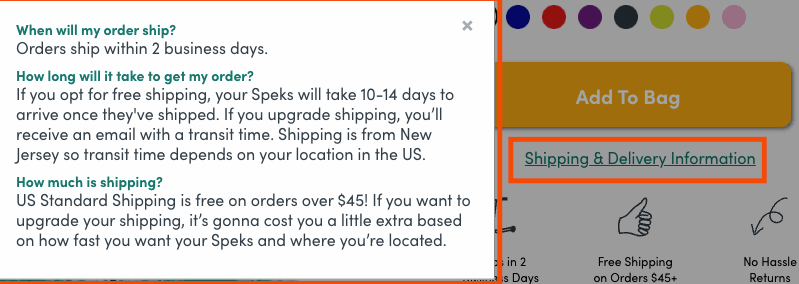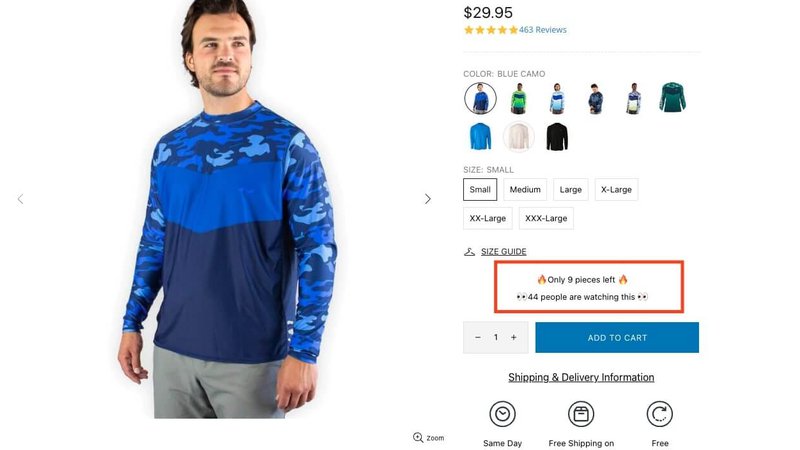How to Hire the Perfect Conversion Rate Optimization (CRO) Agency
This is a comprehensive guide on how to find, hire, and manage the best CRO Agency for your business. Learn what a CRO agency does to improve conversions.
Published November 5, 2024

A recurring question I get from business owners is - should I work with a CRO agency or hire in-house? And it's a really good question because CRO has so many moving parts to it.
A good conversion optimization campaign can include coming up with hypotheses, A/B testing, suggesting design solutions, and sometimes implementing the actual design changes. And you don't want to trust any joe shmoe with the code on your site.
As a CRO marketer, I get asked this question all the time. So in this piece, I'm going to go over the pros and cons of each approach, why CRO is important, and how to hire the best CRO agency for your business.
Who should you hire - an in-house team or a CRO agency?
Like everything in business, there's no clear black or white answer to this, it totally depends on your current scenario, the industry you're in, and the amount of data you have available on your users. Let's go through both scenarios and see the pros and cons of each.
Scenario 1: hiring a full-time CRO marketer
Let's say you were to hire an in-house team member (or A/B testing specialist) to manage your CRO. You spend 2-3 months finding the right person, you take another month to onboard them and eventually they start working on optimization.
You assume that they come to your team with some existing knowledge that they could apply to your business. If they don't, they'll be spending the next 3 months studying methodologies and talking to experts. But let's assume that's not the case.
They walk through their entire methodology of research, which probably takes another 1-2 months. And then they start implementing their first A/B test...2-3 weeks later. At this point, from the moment you told yourself "I want to invest in CRO" to the moment where you've launched your first A/B test, six months have passed. No results have been achieved yet.
I don't know about you, but the opportunity cost of NOT increasing the conversion rate during that half-year (and in some cases even longer) can be detrimental to some businesses. And even if it doesn't make or break your business, it can REALLY slow down your growth. How can you grow when there's been no visual impact on your conversion metrics?
Also, with the standard A/B test win rate being around 30-40%, it may take 3-4 A/B tests until your internal team member gets you a win. Just reaching your first win may take you 3 months of A/B testing (depending on your experimentation resources).
So now you're about 9 months into your relationship with your internal team member. You've paid them a monthly salary plus numerous benefits to keep them from turning over during this time (imagine the cost of them leaving before their first win).
And what if they aren't as good as you thought they were? What if they don't get you ANY results?
The problem with this entire approach is that you can lose precious growth time. And you lose A LOT of money. Money paid out in salary AND money you could have made already had you been converting better (with the right person OR partner).
Often due to organizational structure, red tape/politics, and lack of experience, it'll be difficult for an internal hire to move quickly with a comprehensive CRO campaign. it will be much easier for a conversion agency to hit your conversion goals in a shorter amount of time.
Now that I've made my case for why you shouldn't hire an internal team member, let's talk about why a CRO agency may be a better fit for you.
Scenario 2: hiring a CRO agency
It will take less time for an agency to run through the research portion of their optimization methodology and start A/B testing than for an in-house CRO marketer. Based on my experience, our first A/B test with clients takes about 2 months to launch from the date we sign an agreement.
Since we start testing quicker than the internal team member, results come in much faster. By the time we've run 8 A/B tests, the internal team member would have only ran the first one.
On top of that, a CRO agency will often have a database of winning A/B Tests they've ran for businesses similar to yours. That's something an individual is unlikely to have or even remember. Don't forget that a CRO agency also has a wealth of internal and external resources to take advantage of should there be any hiccups in the optimization process.
Going the agency route, you'll know much faster if the results you are seeing are aligned with the growth you want to achieve.
And if they're not, while you may have lost some investment with that agency, you'll be able to quickly find another one that better fits your goals. Until you find the perfect one for you.
Once you find a CRO agency that gets you results, it's common to stick with them for 12-24 months.
The benefits of working with a CRO agency
To summarize, here are 3 powerful benefits of working with a conversion rate optimization agency.
Convert your traffic better
If you're like most companies, you want to focus on optimizing your conversion rate because you have plans to scale your brand and you want to be sure you are maximizing the efficiency of your ad spend.
When working with a CRO agency, you can be sure that the methodology being applied will be one that has already been tested and proven before you. So you simply reap the benefits of all the data already collected for previous agency clients.
Leveraging this can be incredibly powerful. And it's only possible when there's a network of similar businesses to yours that the agency services.
Because our agency (Shivook) has gone through the foundational research phase so many times though, we've really mastered the process for any eCommerce client we take on.
For example, we had a client that had their own User Experience Research (UX) team, but the team members didn't have the same systems and processes that we've already put in place.
Within just 1 month of working on that client's website, we discovered that, although it appeared the product pages had PLENTY of mentions of shipping & delivery, customers were still struggling to get that information and, in many cases, it lead to store abandonment.
We came up with a basic idea of emphasizing shipping & delivery even more, by placing a hyperlink immediately below the ADD TO CART button that, when clicked on, would open a basic 3-question FAQ pop-up about shipping & delivery.
Here's what it looked like.
What were the results?
A 15.67% Conversion Rate Increase in Product Page Visits with 99% Confidence.
A $0.36 Increase in Revenue Per Website Session with 87% Confidence.
With a CRO agency, you get a system that's already proven to generate results - instead of investing in someone's opportunity to learn how to drive results.
Grow your revenue
When it comes to conversion rate optimization, many people fail to think about how converting traffic better leads to increasing revenue.
Let's say you have an eCommerce brand with 250,000 unique visitors per month, an average order value of $75, and a conversion rate of 2.00%.
Under those assumptions, your revenue should be sitting around $375K per month.
Now let's take a scenario where all variables remain the same and your conversion rate increases by 25%.
Unique Monthly Visitors: 250,000
Average Order Value: $75
Old Conversion Rate: 2.00%
New Conversion Rate: 2.50%
So instead of earning $375K per month, you'll now be earning $486K per month.
Now you're earning $100K more per month than before and you haven't even touched your acquisition channels.
What could you do with an extra $100K monthly?
Re-invest a big chunk of it right back into what fuels the whole system, which will most likely be paid advertising (demand generation).
So then instead of 250,000 unique monthly visitors, you're now generating 325,000 unique monthly visitors.
How does that affect your revenue?
Let's see!
Unique Monthly Visitors: 325,000
Average Order Value: $75
Conversion Rate: 2.50%
Old Revenue: $486K
New Revenue: $609K
Remember where we started?
$375K per month in revenue.
Now we're at $609K per month in revenue.
Isn't that the definition of exponential growth?
If you're curious about how revenue plays a role in the conversion rate for your business, here's an easy-to-use CRO ROI Calculator
Get to know your customers better
Conversion rate optimization is not just about a/b testing, but also about learning what drives the behaviors and decision-making of your target audience.
This data will help you to produce better results at the top of the customer acquisition funnel (social media marketing, content marketing & paid search advertising channels), the middle of the funnel (other areas of the website), and the bottom of the funnel (email marketing).
You'll also gain feedback on product development and what your customer service team could be doing better to communicate more effectively with your customers.
Every conversion rate optimization framework is slightly different, however, the top CRO agencies all do at least these two things.
1) Run post-purchase attribution surveys
A post-purchase attribution survey is run after a customer purchases and focuses on potential bottlenecks the customer faced. It asks the customer about how user-friendly the site was, whether they found everything they were looking for, and how they found the site in the first place.
This is an incredibly powerful survey and the raw data you get back will tell you a lot about your business and how you can improve your conversion rates.
This is one of the core focuses we have when coming up with A/B tests.
2) A/B Test Learnings
What kind of learnings will you get from A/B tests that will help you understand your customers better?
Like our revenue question above, a basic demonstration will help here.
Let's say one of your test hypotheses (based on the research you've conducted) is that people do not have enough information about delivery & shipping on the product page and it's causing website abandonment to a certain degree.
As a result, you build a solution that emphasizes delivery & shipping on the product page to see how it influences behavior.
The result is a 22% increase in the conversion rate (we actually ran a test like this recently that generated a 15% uplift).
Amazing! You got a winner!
But that's not all you've got.
When you analyze the test more closely, you will start to question what impacted the conversion rate uplift.
- Why was this test successful?
- Was it really the new emphasis on shipping & delivery that wasn't there previously?
- And if so, what does that say about your website visitors and customers?
For example, if I see a huge increase in the conversion rate from a test like this, it'd make me think twice about how we talk about shipping & delivery on the website, top of the funnel (e.g. social media advertising), and bottom of the funnel (e.g. email marketing).
If it could really impact the conversion rate to this degree, it must be important.
So, in this case, how do we talk about this topic in other areas of the customer journey?
If your shipping & delivery is particularly fast, is that mentioned in your advertising?
If not, it's worth a test.
Are there other high-touch areas of your website that could emphasize shipping & delivery and equally benefit? Most likely, the answer is yes.
And what about in your retention efforts?
It's probably a good idea to test an additional snippet around shipping & delivery in your email and/or SMS marketing campaigns.
Not only have you won the A/B test, but you've learned what drives your website visitors and customers to make decisions. And once you have done that, you can ideate ways to take that learning and apply it elsewhere to drive a serious impact on your business very quickly.
What does a CRO agency do?
At a high level, the process below is the one we run through for our clients. It will give you insight as to what a CRO agency will do if you choose to go that route.
Foundational Research
All of the top CRO agencies start off every engagement with foundational research.
If you're working with an agency and this is not the case, put up your red flag!
What kind of research am I referring to?
There are 6 areas of analysis we tend to focus on to derive educated solutions that will impact conversion rate.
- Website Heuristics Analysis (aka a conversion audit)
- User Testing Analysis (focused on identifying website conversion issues related to poor user experience)
- Website Abandonment Analysis (Google Analytics, Heatmaps, Surveys)
- Ads Creative Analysis (assuming social media ads or paid search is being used)
- Competitor Analysis
- Historical A/B Tests Analysis (when relevant)
I could literally write another blog post about each one of those specifically and how we use them to come up with creative A/B testing ideas. It's quite complex.
The basic idea behind foundational research is that you're not going to the solution-focused drawing table with your own biases and ideas in mind.
Instead, you're studying your visitors, customers, and several layers of the market, in order to better understand the entire landscape for which someone is considering buying, including AND excluding your website in particular.
Implement Quick Wins
Once you've done your research and discovered the major bottlenecks in the conversion process it's time to implement some quick wins to convert those visitors into customers. The next step is building out ideas and solutions based on those issues you discovered in your research.
When we've got a list of ideas and have prioritized them, we then organize that list based on what ideas require testing and what ideas can be instantly implemented sitewide. Solutions that can be instantly implemented may lead to some quick wins for the store conversion rate.
Here’s an example of a quick win we implemented for a fashion brand.
A/B testing
Now it's time to start running A/B tests.
To determine which A/B test to run, the CRO agency is going to refer back to the A/B testing roadmap that was built immediately after finalizing the foundational research.
A full-service conversion rate optimization agency can manage and execute the entire A/B testing process without any interaction from the client other than approvals and alignments.
Regardless of whether or not you work with a full-service agency, every A/B test is going to require the following resources:
1) Tracking Specialist
The tracking specialist will set up and ensure the tracking of the A/B test goals is working properly prior to launching the test.
2) Conversion / Persuasion Copywriter
The conversion copywriter is going to write persuasive copy when an A/B test requires copy to be written.
3) Conversion / Persuasion UI/UX Designer
Like the copywriter, the UI/UX designer is going to be focused on designing the solution to be as native as possible to the existing website, yet aligned with the vision behind the variant solution.
4) A/B Testing Engineer
The A/B testing engineer will be responsible for figuring out how to take the testing concept, along with the persuasive copy and UI/UX design, and set it up technically within the A/B testing platform (we tend to use Google Optimize). They'll also be sure there are no technical issues with the test.
Most testing platforms allow you to edit HTML/CSS and work with JavaScript so the engineer has the flexibility of taking all of the finished materials and implementing them as-is (or as close to it) within the testing platform.
These are the core resources needed to build each test, however, there are some additional steps along the way that will make the process much smoother.
For example, one thing that we do before handing off any of our ideas to a copywriter, designer, or engineer is to build mobile and desktop wireframes of the solution variant. This gives 100% clarity to those building the solution as to what is expected (generally speaking) from the test variant.
Once a test is launched, an experimentation strategist will most likely be responsible for determining when a test has been completed, based on the data being collected within the A/B testing platform.
While we use Google Optimize, we also will refer to multiple statistical significance calculators to come to conclusion for our A/B tests.
When a test is finished, the CRO agency will analyze the results and share what they've learned. And then rinse and repeat.
Landing page design
Once you run A/B tests for 4-6 months, you will start to question whether or not it makes sense to test a full redesign of your most trafficked landing pages OR if you should just keep optimizing them.
There is no one-size-fits-all approach here and it will depend mostly on what other high-impact ideas are on the existing A/B testing roadmap.
A full landing page design can be quite costly in terms of resources involved (specifically the time it takes to build, QA, etc.) and so usually that'll be an A/B test we work on simultaneously with other solutions on the regular testing roadmap built during the foundational research stage of the methodology.
Another reason we'll wait 4-6 months to do a full overhaul of the landing page design experimentation, is because the chance of a positive result will likely increase after we've already run a number of tests and gained some understanding of the customers and visitors and what influences their decisions.
Sometimes it's better to run multiple multivariate testing designs instead of revamping an entire landing page. Multivariate testing allows us to test multiple elements of the web page simultaneously.
How to find the right conversion rate optimization agency for you
Of course, with so many conversion rate optimization agencies to choose from, it can be difficult to decide which one is the right one for you.
Here are some questions you should ask your CRO agency.
1. Do they have experience in your industry or niche?
First of all, you're going to want to choose an agency that has extensive experience within your business vertical.
For example, if you have an eCommerce store, you're going to be more aligned with an agency that focuses on optimizing eCommerce stores. You'll talk the same talk and walk the same walk.
2. Is CRO the core of their business?
The learning curve will be minimal. Bonus: You'll want to find an agency that focuses exclusively on CRO only and not other digital marketing services. Often a digital marketing agency will tell you they know about CRO, but if it's not their core focus, they will never do it as well as a pure CRO Agency that only offers conversion rate optimization services.
3. What resources do they have on the team?
Some agencies have a wide range of resources - internal copywriters, designers, and developers to take solutions all the way from the idea stage to testing and even implementing test wins on your behalf. Other agencies may not have those internal team members, forcing you to either use your internal resources OR collaborate with contractors to help you on an as-needed basis.
4. Are they data-driven?
You want to be 100% certain that the CRO agency you choose has a data-driven and customer-driven mindset and methodology. When they talk through their process with you, do they talk about data? Do they talk about surveying your visitors? Do they talk about surveying your customers?
Ask them about the source of the solutions they plan to come up with for your business. Is it based on experience alone OR a mixture of experience and qualitative/quantitative analysis? You'll want the latter.








![Competitor Analysis: How to Spy on Your Competition in {year} [Free Template]](https://entail.mayple.com/en-assets/mayple/fit-in/280x280/635592ede551c61cc6cefd0a_austindistelwD1LRb9OeEounsplash11_ae2a6644f2663d2f32cd0295822bfbe3_2000-1699775590539.jpg)